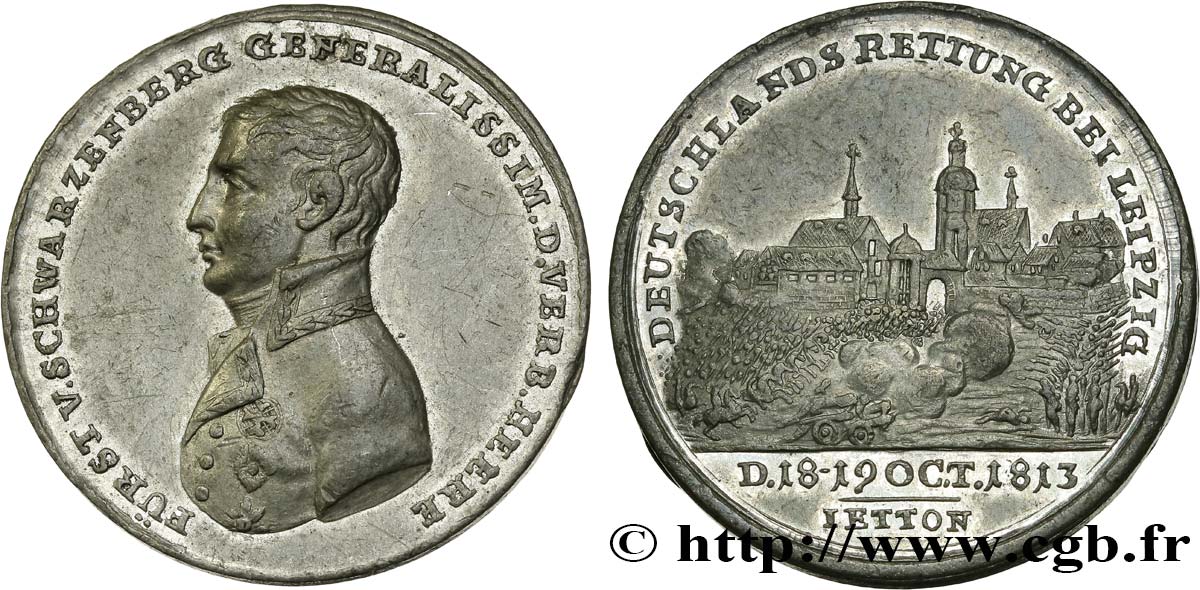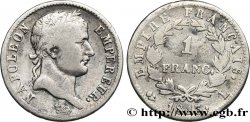E-auction 306-225270 - fme_367397 - PREMIER EMPIRE / FIRST FRENCH EMPIRE Médaille de la bataille de Leipzig
You must signin and be an approved bidder to bid, LOGIN TO BID. Accounts are subject to approval and the approval process takes place within 48 hours. Do not wait until the day a sale closes to register. Clicking on « bid » constitutes acceptance of the terms of use of cgb.fr private e-auctions.
Bids must be placed in whole Euro amounts only. The sale will start closing at the time stated on the item description; any bids received at the site after the closing time will not be executed. Transmission times may vary and bids could be rejected if you wait until the last second. For further information ckeck the E-auctions F.A.Q.
NO BUYER'S FEE.
NO BUYER'S FEE.
| Estimate : | 200 € |
| Price : | 34 € |
| Maximum bid : | 50 € |
| End of the sale : | 25 February 2019 18:23:00 |
| bidders : | 8 bidders |
Type : Médaille de la bataille de Leipzig
Date: 1813
Mint name / Town : Allemagne, Leipzig
Metal : tin
Diameter : 34,5 mm
Orientation dies : 12 h.
Weight : 15 g.
Edge : lisse
Coments on the condition:
Superbe médaille commémorant une victoire autrichienne. Médaille en étain en très bon état avec une agréable patine de collection
Obverse
Obverse legend : FÜRSTV. SCHWARZENBERG GENERALISSIM. D. VERB. HEERE.
Obverse description : Buste à gauche du prince Charles-Philippe de Schwarzenberg.
Reverse
Reverse legend : DEUTSCHLANDS RETTUNG BEI LEIPZIG // D. 18-19 OCT. 1813 / IETTON.
Reverse description : Scène de bataille avec la ville de Leipzig au second plan.
Commentary
La bataille de Leipzig (16-19 octobre 1813), aussi appelée la bataille des Nations, fut la plus grande confrontation des guerres napoléoniennes, et fut une défaite subie par Napoléon Ier.
Karl Philipp, fürst zu Schwarzenberg ou le prince Charles-Philippe de Schwarzenberg, né le 18 avril 1771, Vienne et mort le 15 octobre 1820 à Leipzig, est un ministre d'État et de conférence et feldmaréchal autrichien, président du conseil suprême de la guerre, chevalier du Saint-Esprit et de la Toison d'or. Au mois d'août 1812, Napoléon lui confie le commandement de sa droite et du septième corps, avec lequel il dirige plusieurs opérations de cette campagne, remportant notamment des victoires sur les Russes lors de combats à Gorodetschna et Wolkowisk. Mais l'Autriche ayant retourné ses armes contre la France, il prend la tête de la Grande Armée de Bohême, participe aux batailles de Dresde, de Wachau et de Leipzig, puis entre en Suisse. Il opère sa jonction avec Blücher et, nommé généralissime des armées alliées, concourt au combat de Brienne, s'empare de Troyes et dirige les opérations de cette campagne qui finit par la reddition de Paris.
The Battle of Leipzig (16–19 October 1813), also known as the Battle of the Nations, was the largest confrontation of the Napoleonic Wars, and was a defeat suffered by Napoleon I. Karl Philipp, Fürst zu Schwarzenberg or Prince Charles-Philippe of Schwarzenberg, born on 18 April 1771 in Vienna and died on 15 October 1820 in Leipzig, was an Austrian Minister of State and Conference and Field Marshal, President of the Supreme War Council, Knight of the Holy Spirit and of the Golden Fleece. In August 1812, Napoleon entrusted him with command of his right and the Seventh Corps, with which he directed several operations of this campaign, notably winning victories over the Russians during the battles at Gorodetschna and Wolkowisk. But Austria having turned its weapons against France, he took command of the Grand Army of Bohemia, participated in the battles of Dresden, Wachau and Leipzig, then entered Switzerland. He made his junction with Blücher and, appointed generalissimo of the allied armies, participated in the battle of Brienne, seized Troyes and directed the operations of this campaign which ended with the surrender of Paris.
Karl Philipp, fürst zu Schwarzenberg ou le prince Charles-Philippe de Schwarzenberg, né le 18 avril 1771, Vienne et mort le 15 octobre 1820 à Leipzig, est un ministre d'État et de conférence et feldmaréchal autrichien, président du conseil suprême de la guerre, chevalier du Saint-Esprit et de la Toison d'or. Au mois d'août 1812, Napoléon lui confie le commandement de sa droite et du septième corps, avec lequel il dirige plusieurs opérations de cette campagne, remportant notamment des victoires sur les Russes lors de combats à Gorodetschna et Wolkowisk. Mais l'Autriche ayant retourné ses armes contre la France, il prend la tête de la Grande Armée de Bohême, participe aux batailles de Dresde, de Wachau et de Leipzig, puis entre en Suisse. Il opère sa jonction avec Blücher et, nommé généralissime des armées alliées, concourt au combat de Brienne, s'empare de Troyes et dirige les opérations de cette campagne qui finit par la reddition de Paris.
The Battle of Leipzig (16–19 October 1813), also known as the Battle of the Nations, was the largest confrontation of the Napoleonic Wars, and was a defeat suffered by Napoleon I. Karl Philipp, Fürst zu Schwarzenberg or Prince Charles-Philippe of Schwarzenberg, born on 18 April 1771 in Vienna and died on 15 October 1820 in Leipzig, was an Austrian Minister of State and Conference and Field Marshal, President of the Supreme War Council, Knight of the Holy Spirit and of the Golden Fleece. In August 1812, Napoleon entrusted him with command of his right and the Seventh Corps, with which he directed several operations of this campaign, notably winning victories over the Russians during the battles at Gorodetschna and Wolkowisk. But Austria having turned its weapons against France, he took command of the Grand Army of Bohemia, participated in the battles of Dresden, Wachau and Leipzig, then entered Switzerland. He made his junction with Blücher and, appointed generalissimo of the allied armies, participated in the battle of Brienne, seized Troyes and directed the operations of this campaign which ended with the surrender of Paris.








 Report a mistake
Report a mistake Print the page
Print the page Share my selection
Share my selection Ask a question
Ask a question Consign / sell
Consign / sell
 Full data
Full data













